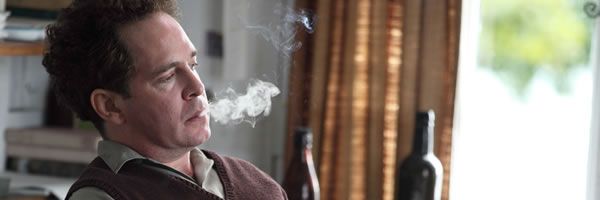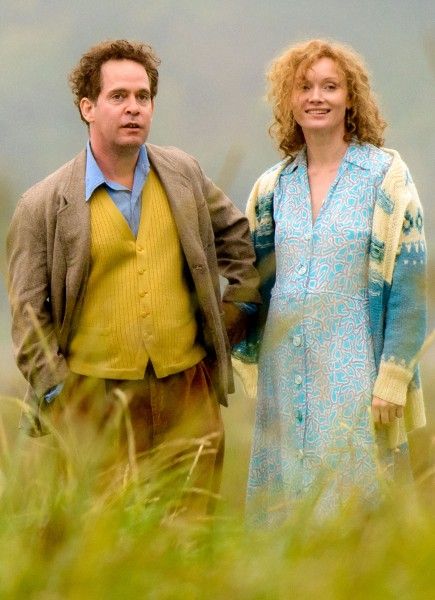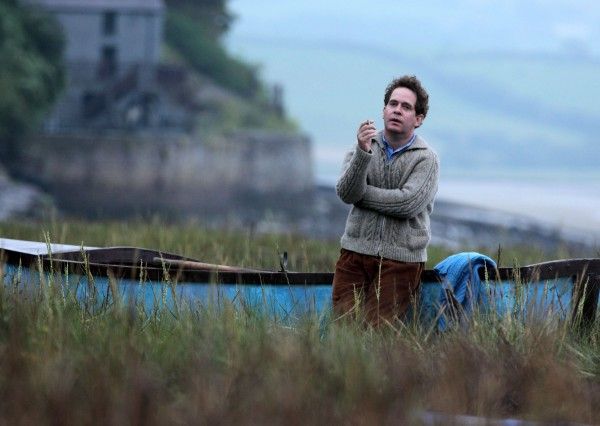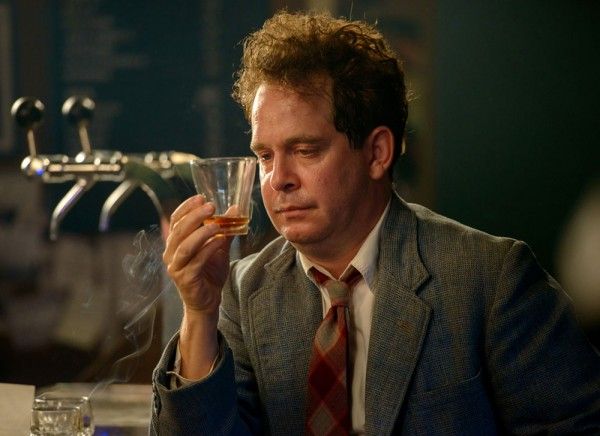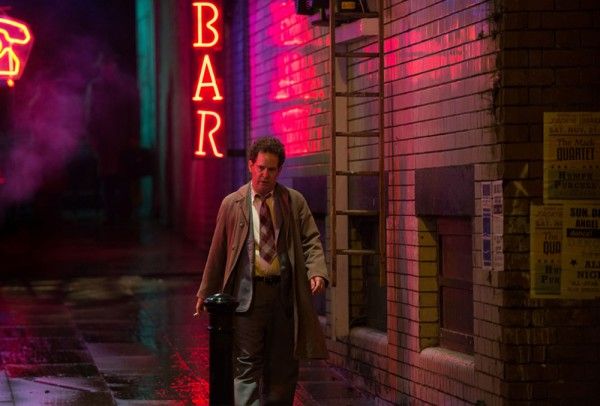Written by Andrew Davies and directed by Aisling Walsh, A Poet in New York explores the final days of adored poet Dylan Thomas (played brilliantly by Tom Hollander). As the creator of some of the most memorable lines in the English language, he became a much-loved celebrity in the US. But his failing marriage and wild lifestyle led to his untimely death in 1953, at the age of 39.
During this exclusive interview with Collider, acclaimed screenwriter Andrew Davies talked about the experience of writing a project about Dylan Thomas, why Dylan Thomas was a boyhood hero of his, what led him down the path of becoming a writer, and the casting process. He also talked about why he decided to take on War and Peace, as a six-part series, collaborating with Guillermo del Toro on the script for Beauty, and that even though he was never asked to write a script for a third Bridget Jones film (he was a writer on the two other films), he would have likely declined. Check out what he had to say after the jump.
Collider: How was the experience of writing a project about Dylan Thomas for the centenary of his birth?
ANDREW DAVIES: It felt very special to me, as a project, because Dylan Thomas was a bit of a boyhood hero of mine. As a fairly innocent teenager, growing up in a village in Wales, I just thought, “God, I would like to go and hang about Soho and write great poetry and try to avoid drinking myself to death.” So, it was a thrilled to get asked to do this. It never occurred to me that his centenary was coming up. It was just a lovely opportunity when (executive producer) Griff Rhys Jones asked me if I was interested in writing something about him.
Over the years, had you ever thought about trying to write something about him, before this?
DAVIES: No, not really. He’d been an influence on me because I started my professional career thinking that I was a poet. That didn’t work out so well, really. Just about the first thing that I managed to sell were radio plays that were very much under his influence. So, to that extent, I’ve been thinking about him, all the time. And of course, I was a teacher at university. For a long time, I combined my career writing with teaching, and I used to teach him. I used to love reading “Fern Hill” to the students, trying to sound as much like him as I could.
Is it surreal to be reminded of all of that while you were working on this?
DAVIES: Yeah. It’s absolutely great. I knew exactly what I wanted to do with this. Griff Rhys Jones’ original idea was to just do a story about the last seven days of his life, and it would be about what killed Dylan Thomas. I thought, “That seems a bit of a shame, really.” Yes, that’s a great story, but it’s a very sad one. There area lot of people in the audience who will never have heard of Dylan Thomas, so I wanted to give a sense of who he was, how terrific his poetry is, celebrate his life, show all of the Welsh scenery, and tell a bit of his love story with Caitlin. So, I said to Griff, “I know exactly what I want to do. I want to get all these elements in and have a very fluid, poetic structure in which we can flashback and forward, and do all of that.” I’m quite curious about how it will go in the States. Amongst people who are interested in literature, he’s probably more famous in New York than he is in the UK, but I have no idea whether the rest of the country has heard of him or not, or how much they would need to know. I was pretty careful, in writing the piece, to give the information that would give people a handle on where he came from, what he was like as a kid, what he was like as a young man, and what he was like at that desperate junction of his life, when he couldn’t seem to go forward and he couldn’t go back. He was stuck.
You have such a way with words, but don’t have any writers in your family. So, what led you down this path?
DAVIES: I think it was because I just had the feeling that I could. I was getting rewarded for writing well, from about the age of five or six. A teacher would say, “Look what Andrew has written,” and I thought, “Maybe I could be a writer.” I had a very high opinion of my father’s judgement of things and he said, “You better get a job that pays the bills because a writer doesn’t make any money. If possible, get a job that allows you to write in your spare time.” School teacher is actually a bit too much of a hard grind, really, for that. But college teaching, I found was great. If you’re ruthless with not going to meetings and not seeking promotion and trying to avoid being in charge of anything but your own students, I found that it was a lovely combination. I actually carried on doing both careers until I was 50, just ‘cause I enjoyed teaching so much. Also, I was a bit frightened about what it would be like, doing nothing but writing. So, I wasn’t really like Dylan Thomas, at all. I had a cautious streak, and I was quite careful with money. I tried not to spend more than I had, which is very unlike him. He was just totally reckless and stupid about money. From my point of view, it’s certainly a comforting feeling to think that you’ve got more money than you actually need. If you can help your friends out, that feels good to me. Whereas, he was always trying to borrow money from friends.
When you’re going to bring a real-life person to life, in this way, do you feel like you have to identify with them, or feel inspired by them, in some way?
DAVIES: Yeah, I think so. The joy of writing drama is putting yourself into different people’s heads. The older I get, the more fun it is to write young people. It’s just a holiday from what is becoming old age, really. I can put myself inside of a kid running through the woods, or a young girl going to her first big ball.
What was the casting like for this?
DAVIES: For the knowledgeable section of the audience, there are a lot of famous photographs of Dylan Thomas, at varying ages. A lot of people know what he looks like, so we did want somebody who could look like that. It was just wonderful when somebody suggested Tom Hollander. I don’t know if it was me or not. It was one of those meetings where you think about who could possibly do it. There was quite a lot of pressure, because it was BBC Wales that did it, to get somebody Welsh. Tom Hollander isn’t Welsh, but he looks a bit like Dylan Thomas. Also, he is so charming and he can make himself loveable. A lot of actors wouldn’t have been able to do that. He could turn on people and be quite nasty to them, and you want somebody who you can forgive, or want to forgive, because you find him appealing, because Dylan Thomas certainly had that. Men and women just fell under his spell. He would turn his attention on you and make you think you were special and in his inner circle. I knew he could do all of that because I’d worked with Tom before, and I’d seen his performances a lot. And then, the director was very keen to have Essie Davis. I knew she was a terrific actress, but all the performances I’ve seen of hers, and there’s quite a lot on YouTube, she sounded so Australian. She was really good, but I thought, “Can she get an English/Welsh accent down quickly.” She could, and she was wonderful. I also assumed we’d get an American actress to play Liz Reitell, and I was alarmed when they cast Phoebe Fox. In person, she’s quite fragile-looking and delicate, and has quite a girly voice, but she just got it. She got the harsh New York accent and convinced us that she’d been around. Liz Reitell had two husbands before she’d ever met Dylan Thomas. So, I was pretty thrilled, really, with all of the performances we got. And really, it’s down to Aisling Walsh’s direction of the piece. She made it look like 1950s New York, which was great.
You’ve taken on some really classic, epic, beautiful stories. Why War and Peace?
DAVIES: Because I was asked, and I thought, “If I don’t do it, somebody else is going to do it, and I won’t like that.” Also, I’d never read War and Peace, and this gave me the incentive to read it. And then, when I read it, I thought, “This is just such a great story.” People always talk of it as a daunting task to read the thing, but it’s actually quite a page-turner. There are skip-able bits in it because Tolstoy was always having arguments with himself about history and politics, and all that kind of thing. It’s got absolutely lovely characters. It’s been such a terrific year or 18 months, with Dylan Thomas followed by War and Peace. I’ve had more pleasure out of writing those two scripts than anything I can remember, for ages and ages and ages.
Did you decide that it needed to be told in six parts?
DAVIES: It was a collective decision. It’s a BBC Wales show, and we talked about that. It could have been anything from four to 12 parts. When it was done in the ‘70s, I think it was about 15 hours, but the pace was very slow. We thought about doing it between six and eight, and then decided to cram it into six. That means that it does move pretty fast, but I think that’s good. We managed to tell the story and give space for the characters to breathe. Of course, we’ll have to see how it comes out, but it’s thrilling.
What was it like to collaborate with Guillermo del Toro on the script for Beauty?
DAVIES: It was great. We turned out to have a similar take on [Beauty and the Beast], and he had a very clear idea of how the story ought to be. It was a bit like the traditional way that they used to do it in the French cinema, where he was basically doing the scenario and I was writing the actual scenes. I did a first draft, and then he did a second draft of it, which was a very light pass. He left about 85% of what I’d done intact, and I was very pleased with it. Since then, for me, it’s just been a lot of waiting around. For him, I guess it’s been a lot of preparation and doing other projects. He’s always got so much on the go, with all of the things he’s producing, directing and writing. I thought he was a lovely person.
Were you ever approached about doing the third Bridget Jones script?
DAVIES: No, I wasn’t. I think I’d have said no because I felt as though I’d had enough with the first two. That’s a funny process, writing those things. Anybody who walks through Working Title offices, they say, “How’d you like to do a draft of Bridget Jones?” And then, Richard Curtis does the final one, and it’s always enormously long. They film about three and a half hours worth, and cut it down to 90 minutes. I like the situation where I’m the writer, and that’s it. But, it was fun working on it. Working Title are very nice employers, in most ways. They’re always very friendly and complimentary, and they send you cases of wine and flowers, and things like that. It’s just not my preferred way of working.
A Poet in New York premieres on BBC America on October 29th.

